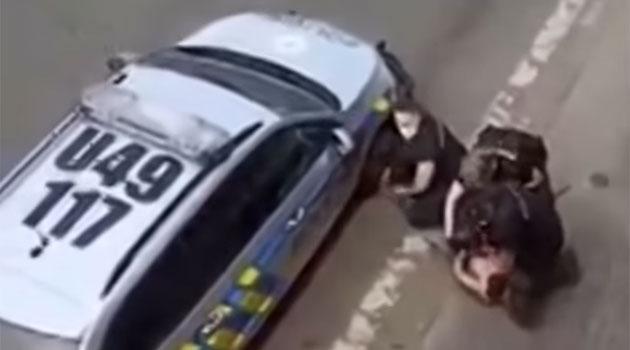Czech General Inspection of Security Forces claims officers' procedure in case of Romani man who died in custody was correct

A press release issued yesterday by the General Inspectorate of Security Forces (GIBS) has announced that police did not, in their view, commit a crime or any other wrongdoing during their operation in Teplice, Czech Republic last June, after which a Romani man died. GIBS has decided that it has not been proved that the death of the man was related to the police intervention and the cause of his death was, according to an expert opinion, heart failure during intoxication with methamphetamine.
“The investigation has revealed that the police intervention against the man was carried out in a standard way, using coercive measures that were lawful, the use of which did not have a proven causal link to the subsequent death,” said GIBS spokesperson Ivana Nguyenová. Mr Stanislav Tomáš was forcibly handcuffed by police officers on 19 June 2021 during his arrest in Teplice and later died.
Bystander video footage of the arrest was published by the Romea.cz news server and shared on social media, and the police intervention was widely criticized by Czech and international activists and organizations who protested it throughout Europe. The video footage shows a police officer kneeling on Mr Tomáš’s neck in a manner reminiscent of the police intervention during which George Floyd, a Black man, was killed in the USA in May 2020.
The Czech Police have always rejected the claim that their officers’ actions contributed to the death of Mr Tomáš. The intervening officers said that Mr Tomáš was aggressive toward them and attacked them, and that they therefore used force to subdue him.
Police then called an ambulance to the scene and the emergency responders attempted to resuscitate him in that vehicle. About 15 minutes later, a doctor at the hospital ruled Mr Tomáš dead.
GIBS preliminarily stated last summer that it did not see the conduct of the police officers as having constituted a criminal offense, but continued to investigate the case. “The investigation continued and was terminated with the result that no crime or other wrongdoing was committed by the intervening police officers in connection with the operation,” Nguyenová said.
In December, Deputy Public Defender of Rights Monika Šimůnková stated in an interim report on the inquiry that while the need for medical treatment for Mr Tomáš had been obvious from the beginning of the operation, the intervening police officers did not call for emergency services in time. According to Šimůnková, none of the police officers monitored the condition of Mr Tomáš’s health during their use of force.
Police failed to discover in time that Mr Tomáš had stopped showing signs of life, the Deputy Public Defender of Rights has found. However, according to Nguyenová, GIBS did not find that there had been a delay in calling the paramedics.
According to GIBS, police verbally communicated with the detained man until the arrival of the paramedics, which GIBS claims is documented by some video recordings of the incident. The Deputy Public Defender of Rights also criticized the fact that after police discovered the need for emergency medical response, they failed to remove the handcuffs from Mr Tomáš and failed to initiate immediate resuscitation on their own.
“The handcuffs were removed from the man in the ambulance at the request of an emergency responder, at the time of his collapse,” the GIBS spokesperson described. “Before then, the danger still existed that the man could have continued to harm himself or to attack the police or the rescue workers.”
According to an expert opinion, the cause of the man’s death was heart failure after ingestion of methamphetamine. Serious damage to the heart muscle cells had already occurred before the police patrol arrived, according to the GIBS findings.
“In this case, heart failure would have occurred even without an attempt to reduce the man’s aggression,” the GIBS spokesperson claimed. “In other words, the death occurred in a direct causal relationship with the intoxication by methamphetamine, not with the actions of the intervening police officers.”
After Mr Tomáš’s death, several demonstrations took place domestically and internationally, and a thorough investigation of the incident was requested by a number of Czech and international human rights organizations. People protested against the police intervention in Teplice in front of the Czech Embassy in Bucharest, Romania, and members of the Romani community in Kosovo organized a protest march to the Czech Embassy in Prishtina.
